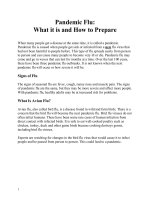Obligation and freedom to act
Bạn đang xem bản rút gọn của tài liệu. Xem và tải ngay bản đầy đủ của tài liệu tại đây (15.22 KB, 1 trang )
Obligation and freedom to act
We use modal auxiliary verbs to express various aspects of obligation and freedom. These uses of modal verbs
are very important in the polite expression of requests, invitations and instructions.
Strong obligation
We can express strong obligation using must and need. In orders, we sometimes use will to express strong
obligation.
You must send your application on or before the 18th of this month.
They must pay the dues.
We must learn to cooperate.
You need a visa to visit foreign countries.
He needs to improve his communication skills.
She needs to work harder.
All students will hand in their assignments by Friday. (This is actually an order.)
She will clean the floors whether she likes it or not.
Prohibition
To prohibit we can use the auxiliaries must not, may not and cannot.
Students must not use the staff car park.
You may not smoke in the kitchen.
Books may not be taken out of the library.
You can’t wear that dress to work.
She can’t do it.
Weak obligation; recommendation
These ideas are expressed using the auxiliary verbs should, ought, had better, might and shall.
You should stop smoking.
He ought to sort things out.
You had better get that mole checked.
She really ought to mend her ways.
You might ask his opinion.
What shall we do now?
Stay on top of your writing! Download our grammar guide from www.englishgrammar.org to stay up-to-date.
Powered by TCPDF (www.tcpdf.org)









